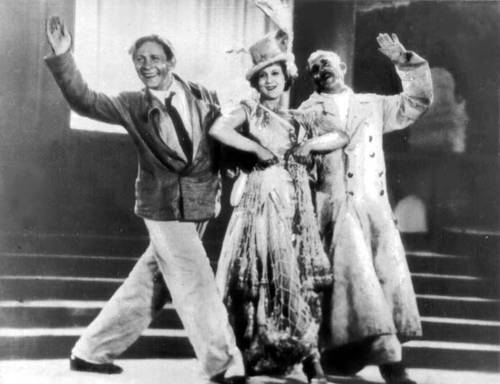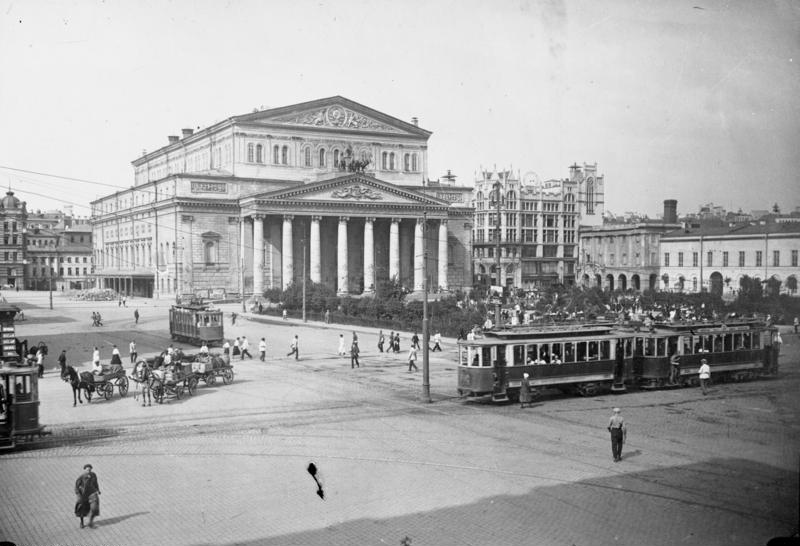|
Leonid Utyosov
Leonid Osipovich Utyosov or Utiosov (russian: link=no, Леонид Осипович Утёсов, uk, link=no, Леонід Йосипович Утьосов); real name Lazar (Leyzer) Iosifovich Vaysbeyn or Weissbein ()) (, Odesa – 9 March 1982, Moscow) was a famous Soviet estrada singer, and comic actor, who became the first pop singer to be awarded the prestigious title of People's Artist of the USSR in 1965. Biography Leonid Utyosov was brought up in Odesa, Russian Empire and attended the Faig School of Commerce, from which he dropped out and joined the Borodanov Circus troupe as an acrobat. He started his stage career in 1911 in Kremenchuk, then returned to Odesa, changed his artistic name to Leonid Utyosov, and performed as a stand up comedian with the Rosanov troupe and with the Rishelyavsky Theatre. In 1917, he won a singing competition in Gomel, Belarus, then performed in Moscow. In the 1920s, he moved to Leningrad and set up one of the first Soviet jazz bands. In ... [...More Info...] [...Related Items...] OR: [Wikipedia] [Google] [Baidu] |
Jolly Fellows (1934 Film)
''Jolly Fellows'' (russian: Весёлые ребята, Vesyolye rebyata), also translated as ''Happy-Go-Lucky Guys'', ''Moscow Laughs'' and ''Jazz Comedy'', is a 1934 Soviet musical film, directed by Grigori Aleksandrov and starring his wife Lyubov Orlova, a gifted singer and the first recognized star of Soviet cinema. The script was written by Aleksandrov, Vladimir Mass, and Nikolai Erdman (whose father briefly appears on screen as a German music teacher). It features several songs which instantly became classics across the Soviet Union. The most famous song — "Kak mnogo devushek khoroshikh" (''Such a lot of nice girls'') — enjoyed international fame, covered as " Serdtse" (''Heart'') by Pyotr Leshchenko. Music was by Isaak Dunayevsky, the lyrics were written by the Soviet poet Vasily Lebedev-Kumach. Both Orlova and her co-star, the jazz singer and comic actor Leonid Utyosov, were propelled to stardom after this movie. Plot Yelena (Mariya Strelkova), a well-off woul ... [...More Info...] [...Related Items...] OR: [Wikipedia] [Google] [Baidu] |
Mikhaylovsky Theatre
The Mikhailovsky Theatre (russian: Миха́йловский теа́тр) is one of Russia's oldest opera and ballet houses. It was founded in 1833 and is situated in a historical building on 1, Arts Square in Saint Petersburg. It is named after Grand Duke Michael Pavlovich of Russia. Since 1989, it has borne the Modest Mussorgsky name. Since 1991 it has officially been named The St Petersburg Mussorgsky State Academic Opera and Ballet Theatre—Mikhailovsky Theatre. History Before 1871 The theatre was established in 1833 by decree of Tsar Nicholas I. Before the 1917 Revolution, the Mikhailovsky did not have its own resident company. Performances were given either by a French company, hired by the Russian Imperial Theatres, or at the end of the century by the Mariinsky Theatre and Alexandrinsky Theatre companies. When the Bolsheviks took power the French company was forced to leave Russia, and in 1917 the Mikhailovsky Theatre was closed. Communist era On 6 March 19 ... [...More Info...] [...Related Items...] OR: [Wikipedia] [Google] [Baidu] |
Minor Planet
According to the International Astronomical Union (IAU), a minor planet is an astronomical object in direct orbit around the Sun that is exclusively classified as neither a planet nor a comet. Before 2006, the IAU officially used the term ''minor planet'', but that year's meeting reclassified minor planets and comets into dwarf planets and small Solar System bodies (SSSBs).Press release, IAU 2006 General Assembly: Result of the IAU Resolution votes International Astronomical Union, August 24, 2006. Accessed May 5, 2008. Minor planets include s ( ne ... [...More Info...] [...Related Items...] OR: [Wikipedia] [Google] [Baidu] |
Russia Stamp L
Russia (, , ), or the Russian Federation, is a transcontinental country spanning Eastern Europe and Northern Asia. It is the largest country in the world, with its internationally recognised territory covering , and encompassing one-eighth of Earth's inhabitable landmass. Russia extends across eleven time zones and shares land boundaries with fourteen countries, more than any other country but China. It is the world's ninth-most populous country and Europe's most populous country, with a population of 146 million people. The country's capital and largest city is Moscow, the largest city entirely within Europe. Saint Petersburg is Russia's cultural centre and second-largest city. Other major urban areas include Novosibirsk, Yekaterinburg, Nizhny Novgorod, and Kazan. The East Slavs emerged as a recognisable group in Europe between the 3rd and 8th centuries CE. Kievan Rus' arose as a state in the 9th century, and in 988, it adopted Orthodox Christianity from the Byzan ... [...More Info...] [...Related Items...] OR: [Wikipedia] [Google] [Baidu] |
Ted Lewis (musician)
Theodore Leopold Friedman (June 6, 1890 – August 25, 1971), known as Ted Lewis, was an American entertainer, bandleader, singer, and musician. He fronted a band and touring stage show that presented a combination of jazz, comedy, and nostalgia that was a hit with the American public before and after World War II. He was known by the moniker "Mr. Entertainment" or Ted "Is Everybody Happy?" Lewis. He died of lung failure in August 1971. Early life Born in Circleville, Ohio, Lewis was one of the first Northern musicians to start imitating the New Orleans jazz musicians who came up to New York in the teens. He first recorded in 1917 with Earl Fuller's Jazz Band, who were attempting to copy the sound of the city's newest sensation, the Original Dixieland Jass Band. At the time, Lewis did not seem to be able to do much on the clarinet other than trill. (Promoting one recording the Victor catalog stated: "The sounds as of a dog in his dying anguish are from Ted Lewis' clarinet" ... [...More Info...] [...Related Items...] OR: [Wikipedia] [Google] [Baidu] |
Alexander Tsfasman
Alexander Naumovich Tsfasman (russian: Александр Наумович Цфасман; born December 14, 1906 - died February 20, 1971) was a Soviet Jazz pianist, composer, conductor, arranger, publisher and activist. He was an important figure in Soviet Jazz from the period of the mid-1920s until the late 1960s. Tsfasman was born in Alexandrovsk (now Zaporizhya, Ukraine) in the Russian empire, and graduated from the Nizhegorod Musical Technicum in 1923, where he played percussion in the orchestra, and graduated from the Moscow Conservatory in 1930 from the piano class of Felix Blumenfeld. [...More Info...] [...Related Items...] OR: [Wikipedia] [Google] [Baidu] |
Richard Stites
Richard Stites (December 2, 1931 – March 7, 2010) was a historian of Russian culture and professor of history at Georgetown University, famed for "landmark work on the Russian women’s movement and in numerous articles and books on Russian and Soviet mass culture." Background Richard Thomas Stites was born on December 2, 1931, in Philadelphia, PA. He earned a BA in History from the University of Pennsylvania in 1956, and MA in European history from George Washington University in 1959, and a doctorate in Russian History in 1968 from Harvard University under Nicholas V. Riasanovsky and Richard Pipes. Career In the early 1960s, Stites taught at Lycoming College before he entered Harvard. He taught at Brown University and the Ohio State University at Lima and then joined Georgetown University in 1977, where he taught until he died. He was selected for numerous IREX exchanges with Russia, he taught for a time at the U.S. Army Russian Institute in Garmisch-Partenkirchen, Ger ... [...More Info...] [...Related Items...] OR: [Wikipedia] [Google] [Baidu] |
Theatre Square (Moscow)
Theatre Square or Teatralnaya Square (russian: Театральная площадь, ''Teatralnaya ploshchad''), known as Sverdlov Square between 1919 and 1991, is a city square in the Tverskoy District of central Moscow, Russia. It is at the junction of Kuznetsky Bridge Street, Petrovka Street, and Theatre Drive (north-west of the latter; the square south-east of Theatre Drive is the separate Revolution Square). The square is named after the three theatres located on it: the Bolshoi Theatre, Maly Theatre, and Russian Academic Youth Theatre. The square is served by the Moscow metro at the Teatralnaya station on the Zamoskvoretskaya Line; Okhotny Ryad station on the Sokolnicheskaya Line; and Ploshchad Revolyutsii station on the Arbatsko-Pokrovskaya Line. History The square emerged after the 1812 Fire of Moscow and conversion of the Neglinnaya River into an underground channel. The river still flows diagonally under the square's park. It was designed in a symmetric ... [...More Info...] [...Related Items...] OR: [Wikipedia] [Google] [Baidu] |
Victory Day (9 May)
etc. , nickname = , observedby = Russia and some former states of Soviet Union and Warsaw Pact; Serbia, Israel , duration = 1 day , frequency = Annual , date = 9 May , scheduling = same day each year , celebrations = , observances = , relatedto = Victory in Europe Day Victory Day russian: День Победы, Den' Pobedy uk, День Перемоги, Den' Peremohy be, Дзень Перамогі, Dzień Pieramohi uz, Gʻalaba kuni, Ғалаба куни kk, Jeñis Küni, Жеңіс Күні ka, გამარჯვების დღე, gamarjvebis dghe az, Qələbə Günü, Гәләбә Ҝүнү ro, Ziua Victoriei (Moldovan Cyrillic: Зиуа Викторией) ky, Жеңиш майрамы, Jengish Mayramy tg, Рӯзи Ғалаба, Rūzi Ghalaba hy, Հաղթանակի օրը, Haght'anaki ory tm, Ýeňişlar Harçlaarsiň, Еңишлар Харчлаарсиң is a holiday that commemorates the Soviet victory over Nazi Ge ... [...More Info...] [...Related Items...] OR: [Wikipedia] [Google] [Baidu] |
World War II
World War II or the Second World War, often abbreviated as WWII or WW2, was a world war that lasted from 1939 to 1945. It involved the World War II by country, vast majority of the world's countries—including all of the great powers—forming two opposing military alliances: the Allies of World War II, Allies and the Axis powers. World War II was a total war that directly involved more than 100 million Military personnel, personnel from more than 30 countries. The major participants in the war threw their entire economic, industrial, and scientific capabilities behind the war effort, blurring the distinction between civilian and military resources. Air warfare of World War II, Aircraft played a major role in the conflict, enabling the strategic bombing of population centres and deploying the Atomic bombings of Hiroshima and Nagasaki, only two nuclear weapons ever used in war. World War II was by far the List of wars by death toll, deadliest conflict in hu ... [...More Info...] [...Related Items...] OR: [Wikipedia] [Google] [Baidu] |
Serdtse (song)
"Serdtse" (russian: Сердце; translated as "Heart") is in its version sung by Pyotr Leshchenko one of the most frequently performed Argentine Tango songs not sung in the Spanish language. Title Originally the song was referred to by its first line as ''Как много девушек хороших'' (''Kak mnogo devushek khoroshikh'', So many nice girls). It was written by Vasily Lebedev-Kumach for the 1934 Soviet film musical '' Jolly Fellows''. The music was by Isaak Dunayevsky. The first singer of the song was Leonid Utyosov. In 1935, Pyotr Leshchenko started to sing the song in Argentine tango fashion. Although music by Leshchenko was officially disliked in the Soviet Union, the version as sung by Leshchenko gradually became the norm. In the former Soviet Union, the song is still perceived as a traditional Russian romance, whereas elsewhere in the world, the song is seen exclusively as an Argentine tango song. This tango version was always known as ''Сердце'' ... [...More Info...] [...Related Items...] OR: [Wikipedia] [Google] [Baidu] |




